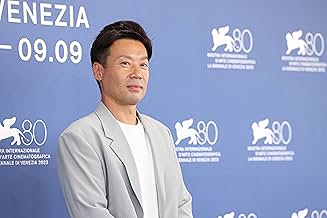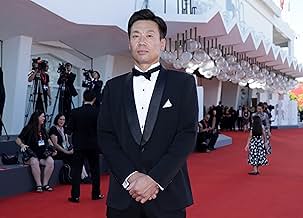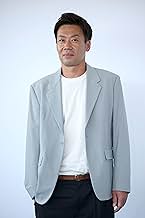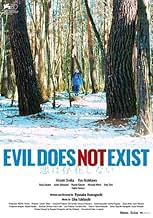Takumi and his daughter Hana live in Mizubiki Village, close to Tokyo. One day, the village inhabitants become aware of a plan to build a camping site near Takumi's house, offering residents... Read allTakumi and his daughter Hana live in Mizubiki Village, close to Tokyo. One day, the village inhabitants become aware of a plan to build a camping site near Takumi's house, offering residents a comfortable escape to nature.Takumi and his daughter Hana live in Mizubiki Village, close to Tokyo. One day, the village inhabitants become aware of a plan to build a camping site near Takumi's house, offering residents a comfortable escape to nature.
- Awards
- 17 wins & 45 nominations total
Featured reviews
In a way it starts very cleverly with very slow nature scenes, illustrating how closely connected these people are to their natural surroundings, how they live off and in harmony with the land. They gather wood for heating, they collect spring water for drinking and cooking, they recharge by walking long distances and admiring the stunning beauty of the surroundings, they memorize the different trees, they look out for wild animals, they help each other.
And then Hamaguchi is the perfect director to create a scene showing a public gathering with public speakers and audience interaction. He did a lengthy scene in Happy Hour as well. He can create meaningful dialogue with stand-out lines. And quite a bit of tension. And we move to the theme of capitalism corrupting everything in its path, with no regard for the destruction it leaves behind. It's facts, figures, stats, consultant advice, bending the law and using it to your advantage. The waste of five people is still below the accepted limit of pollution. It's better than city water anyway.
Then we dig deeper into the struggles of the glamping company workers, who are caught between empathizing with the locals and working for a man who wants to make money. He is not exactly a ruthless money man, he is actually trying to run a profitable business and sees the bottom line. The advisor is the cynical one. But the director takes the advice to heart. The funds are received and partially spent, he can't back down.
And then there's the enigmatic Takumi, the quiet, but trusted lumberjack, or jack of all trades and the poor hapless Takahashi, the former talent agent who experiences a sudden urge to commune with nature.
Slow start that kind of makes sense in the grand scheme of things, but it still tests your patience, and indeed a very odd, somewhat upsetting and inexplicable ending. The middle part is sublime but the rest didn't quite gel well together.
I read the director's explanation, but it's still not coming through in my opinion.
And then Hamaguchi is the perfect director to create a scene showing a public gathering with public speakers and audience interaction. He did a lengthy scene in Happy Hour as well. He can create meaningful dialogue with stand-out lines. And quite a bit of tension. And we move to the theme of capitalism corrupting everything in its path, with no regard for the destruction it leaves behind. It's facts, figures, stats, consultant advice, bending the law and using it to your advantage. The waste of five people is still below the accepted limit of pollution. It's better than city water anyway.
Then we dig deeper into the struggles of the glamping company workers, who are caught between empathizing with the locals and working for a man who wants to make money. He is not exactly a ruthless money man, he is actually trying to run a profitable business and sees the bottom line. The advisor is the cynical one. But the director takes the advice to heart. The funds are received and partially spent, he can't back down.
And then there's the enigmatic Takumi, the quiet, but trusted lumberjack, or jack of all trades and the poor hapless Takahashi, the former talent agent who experiences a sudden urge to commune with nature.
Slow start that kind of makes sense in the grand scheme of things, but it still tests your patience, and indeed a very odd, somewhat upsetting and inexplicable ending. The middle part is sublime but the rest didn't quite gel well together.
I read the director's explanation, but it's still not coming through in my opinion.
I would describe this intriguing movie as made up of three main elements. The first one is the classical conflict between a rural community and the power of business here represented by a glamping (glamorous camping) project. This is the plot setting, but it is not the most important. The second element is represented by the consciousness and emotion of the characters, by their interactions inside the community and with the two representatives of the glamping company. The third element is the surprising and ambiguous ending where the title of the movie "Evil does not exist" becomes meaningful.
The collaboration of the director and the score composer Ishibashi Eiko is particularly interesting since the film originated from a request to create images to accompany a piece of music.
The collaboration of the director and the score composer Ishibashi Eiko is particularly interesting since the film originated from a request to create images to accompany a piece of music.
This film was supposed to be a 30 minute cinematic accompaniment to a score that the director's friend made, only that during the collection of video material Hamaguchi had this story idea and made a full feature film instead. The story starts off intriguing: a small Japanese community in the mountains is slightly challenged by the arrival of a company that wants to build a camping resort in their area without any knowledge of or interest in local issues or the damage they would do. There is even a long town hall discussion between the company representatives and the townsfolk which was truly inspiring. I mean, I can't imagine a European or American community reacting in such a measured, well mannered, well thought out and informed manner.
But this is where the movie veers into the absurd. People make life changing decisions in seconds, without being challenged by the ones around them - kind of like Hamaguchi's decision to finish the film the way he did, musical score and nature scenes take the place of plot and then it's one of those WTF endings. Presumably, the author wanted us to make our own mind about what the movie is about. Well, director-sama, that's the same thing as having nothing in particular to say.
The cinematography was good, the music excellent, the interactions between people natural, authentic, deep. The story was absolute rubbish.
Bottom line: in the end, a short cinematic companion to a music score became a very long and obtuse cinematic companion to a music score. Top marks for the music!
But this is where the movie veers into the absurd. People make life changing decisions in seconds, without being challenged by the ones around them - kind of like Hamaguchi's decision to finish the film the way he did, musical score and nature scenes take the place of plot and then it's one of those WTF endings. Presumably, the author wanted us to make our own mind about what the movie is about. Well, director-sama, that's the same thing as having nothing in particular to say.
The cinematography was good, the music excellent, the interactions between people natural, authentic, deep. The story was absolute rubbish.
Bottom line: in the end, a short cinematic companion to a music score became a very long and obtuse cinematic companion to a music score. Top marks for the music!
Ryusuke Hamaguchi's followup to his masterful DRIVE MY CAR confronts the audience with its title but eases the viewer in with a long pastoral credit sequence. Then, an abrupt cut. Hamacuchi and cinematographer Yoshio Kitagawa do this a few times during the movie, as if jarring the viewer to pay attention.
Takumi (Hitoshi Omika) is a local jack of all trades in a small secluded Japanese mountain village. He lives his daughter, Hana (Ryo Nishikawa). Takumi and his circle of friends are happy with their quiet life, but their tranquility is threatened when a large firm decides to build a glamping (glamour camping) development in the area. The company is so large that when they hold a town meeting, they outsource the task to a pair of publicists (Ryuji Kosaka and Ayaka Shibutani) - further alienating the residents.
Writer-Director Hamaguchi isn't so much interested in the nuts and bolts aspects (although that meeting amusingly delves deeply into such details as sewerage), as setting up a parable about man and nature. Hamaguchi meticulously reveals how even one small change to the Eco system can upset the natural order and balance of life.
This isn't to say that Hamaguchi completely abandons the fine tuned dialogue that made DRIVE MY CAR so indelible. There's an extended sequence when the two corporate flacks have a lengthy and fascinating personal discussion as they drive out to try and offer Takumi a role in the glamping scheme. The one significant critique here is that the movie does strain a bit in trying to make its argument. Hamaguchi has said that he began the project as a half hour dialogue free short subject. The seams do show. Still, the filmmaking is top notch and the mostly amateur cast gives it a grounded reality no matter how high-minded the themes get. The finale is devastating and will stay with you long after the fade-out.
Takumi (Hitoshi Omika) is a local jack of all trades in a small secluded Japanese mountain village. He lives his daughter, Hana (Ryo Nishikawa). Takumi and his circle of friends are happy with their quiet life, but their tranquility is threatened when a large firm decides to build a glamping (glamour camping) development in the area. The company is so large that when they hold a town meeting, they outsource the task to a pair of publicists (Ryuji Kosaka and Ayaka Shibutani) - further alienating the residents.
Writer-Director Hamaguchi isn't so much interested in the nuts and bolts aspects (although that meeting amusingly delves deeply into such details as sewerage), as setting up a parable about man and nature. Hamaguchi meticulously reveals how even one small change to the Eco system can upset the natural order and balance of life.
This isn't to say that Hamaguchi completely abandons the fine tuned dialogue that made DRIVE MY CAR so indelible. There's an extended sequence when the two corporate flacks have a lengthy and fascinating personal discussion as they drive out to try and offer Takumi a role in the glamping scheme. The one significant critique here is that the movie does strain a bit in trying to make its argument. Hamaguchi has said that he began the project as a half hour dialogue free short subject. The seams do show. Still, the filmmaking is top notch and the mostly amateur cast gives it a grounded reality no matter how high-minded the themes get. The finale is devastating and will stay with you long after the fade-out.
It's funny to see people who no doubt gushed over "Perfect Days" dismiss "Evil Does Not Exist" as "boring" and "obscure". Like PD, it begins by following a man's quotidian routine: chopping wood, drawing water, identifying wild plants, teaching his daughter the names of trees. Perhaps the fact that he lives in a mountain town of no architectural or historical significance is what turns them off, but I found Takumi's activities as riveting as those of PD's public toilet cleaner.
As in "Drive My Car", we're exposed to a Japan that a few visitors--including many Japanese--have seen. As someone who was raised in Japan and returns regularly, I was thrilled to see a mountain location like the places I visited last year. I also found the plot--the incursion of a glamping company on the town's pristine land--riveting. What began as a fight-the-power, urban-rural plot turned out completely differently from the norm, a surprise I'm still thinking about days later.
As in "Drive My Car", we're exposed to a Japan that a few visitors--including many Japanese--have seen. As someone who was raised in Japan and returns regularly, I was thrilled to see a mountain location like the places I visited last year. I also found the plot--the incursion of a glamping company on the town's pristine land--riveting. What began as a fight-the-power, urban-rural plot turned out completely differently from the norm, a surprise I'm still thinking about days later.
Did you know
- TriviaIn an interview with "The Los Angeles Times" published on May, 2, 2024, director Ryûsuke Hamaguchi decided to cast Hitoshi Omika as the lead role after Omika spent much time driving Hamaguchi around to rural locations in Japan to pick out locations to film for the director's concert film "Gift". This somewhat mirrored the plot of Hamaguchi's "Drive My Car".
- SoundtracksFether
composed by Eiko Ishibashi
- How long is Evil Does Not Exist?Powered by Alexa
Details
- Release date
- Country of origin
- Language
- Also known as
- El mal no existe
- Filming locations
- Production companies
- See more company credits at IMDbPro
Box office
- Gross US & Canada
- $831,685
- Opening weekend US & Canada
- $42,752
- May 5, 2024
- Gross worldwide
- $3,261,306
- Runtime1 hour 46 minutes
- Color
- Sound mix
- Aspect ratio
- 1.66 : 1
Contribute to this page
Suggest an edit or add missing content


























